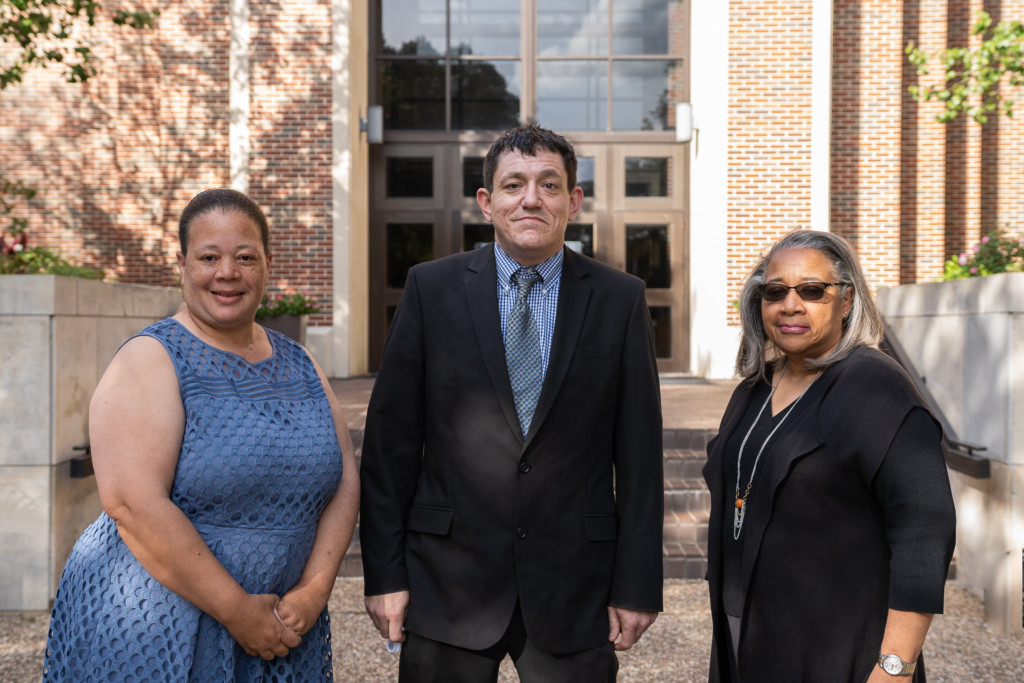PRAIRIE VIEW, Texas (December 2, 2021) – Prairie View A&M University is set to receive a boost that will make more historical documents available to researchers, students and the public. A team consisting of University Archivist Phyllis Earles, Special Collections Librarian Lisa Stafford and History Professor DeWayne Moore, Ph.D., has been awarded two highly competitive grants from the National Endowment for the Humanities and the Texas State Library and Archives Commission.
Moore took the lead on writing the grants and drafted grant narratives in only a few short days.
“Though I served as the lead writer for both the $15,000 Preservation Assistance Grant from the National Endowment for the Humanities and the almost $20,000 TexTreasures Grant from the Texas State Library and Archives Commission, the credit for the awards lies with the principal investigator [Earles] and co-principal investigator [Stafford]. My job was to realize their personal and professional visions,” Moore said.
The grants will help fund a significant portion of the preservation and processing work to make valuable collections more readily available for research. The work should be completed in time to commemorate both the 250th anniversary of the founding of the United States and the 150th anniversary of the founding of PVAMU in 2026.
“Both grants will allow us to expand our network base, expose our students to potential career options in preservation, conservation, digital and information science, elevate the university archives and university profiles, expose our students to minorities in the archival field of study and open doors to infinite possibilities,” Earles said.
The NEH theme is “A More Perfect Union,” in preparation for the upcoming United States Semiquincentennial. Its stated goal is to support projects that “inform and enlighten Americans about the nation’s history, culture, literature, law, art and traditions.” Out of 170 eligible NEH applications, PVAMU was one of 71 projects chosen for funding.
“When an individual develops a more profound understanding of the humble beginning of the African-American experiences at a former slave plantation, it creates a greater awareness, a sense of pride, and respect that will hopefully encourage them to work harder so future generations can read and research the contributions of their forefathers,” Earles said. “The cycle continues to grow and flourish despite the obstacles we face.”
Building on a Historical Foundation
In December 2020, Moore was appointed as grants subcommittee director of the History Program’s working group for the Epa Committee on the Legacy of Slavery and the Impact of Segregation, which falls under the Ruth J. Simmons Center for Race and Justice. He read an article co-authored by Marco Robinson, Ph.D., assistant director of the Ruth J. Simmons Center for Race and Justice, and Earles on the lack of personnel and resources available to process the many valuable documents contained in the PVAMU archives and special collections. He immediately recognized a need to collaborate with the university archivists to aggressively pursue grant funding to make these documents available to everyone.
“Dr. Robinson and I agreed early on that the number one job of the grants subcommittee was to realize the unfinished vision of Phyllis Earles, whose relationship to PVAMU started back in the 1970s and continues to inspire students, staff and anyone who has the privilege of working alongside such an inspiring custodian of institutional history. The collections in the university archives are as important to the success of our students as they are to the work of the Center for Race and Justice and the Epa Committee,” Moore said.
Partaking in Work for a Greater Good
Over the last eight months, Moore, Earles and Stafford have written more than $600,000 in grants, including the two recently awarded and several more that will be announced later in the year. In the spirit of transparency, Moore has made each grant proposal available to the public.
“The much-needed funds will be used to update a 10-plus-year-old report, address some critical infrastructure, collection and staffing needs, as well as to conduct an Environmental Assessment of the Special Collections and Archives Department [at PVAMU],” Stafford said. “The funds will also be utilized to focus on processing and making accessible the Dr. George Ruble Woolfolk, Sr. Collection, which is integral to the 250th Anniversary of America and the 150th Anniversary of PVAMU.”
In discussing the importance of preserving and making these collections available to the community, Moore points to the work of historian Jeanne Theoharris, who argued racial segregation was rooted in resource hoarding, and substantive desegregation must be about equitable re-distribution of resources.
“We submitted these grants to redress the legacy of slavery and segregation in the university archives, and we believe that history will judge us by the silences and erasures of our institutional history,” Moore said. “The success of our students is the key to a more transformative future.”
Through the grants, more than 20 students will be hired to help complete the work. The projects will provide opportunities for career building and networking with other archivists and collections.
The team encourages faculty members and students to explore grant opportunities and collaborate with others on grants.
“One strong benefit of grants is that if there are budget shortfalls, constraints or cuts, grants can serve to supplement and enable special projects to happen that otherwise may not be under the normal operating budgets,” Stafford said. “Grants can help you gain national exposure and promote your credibility and the credibility of your organization.”
By Jocelyn Kerr
-PVAMU-

